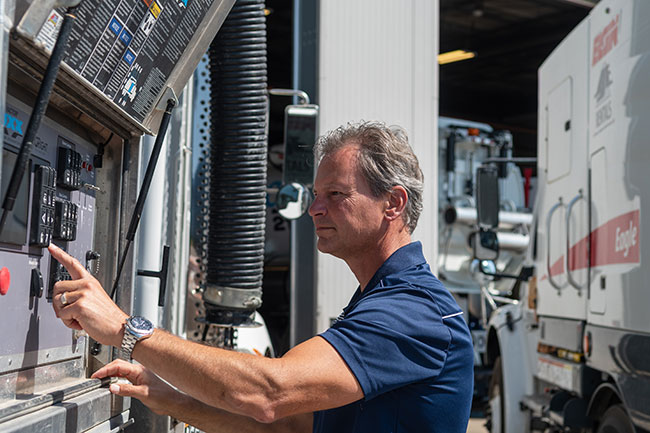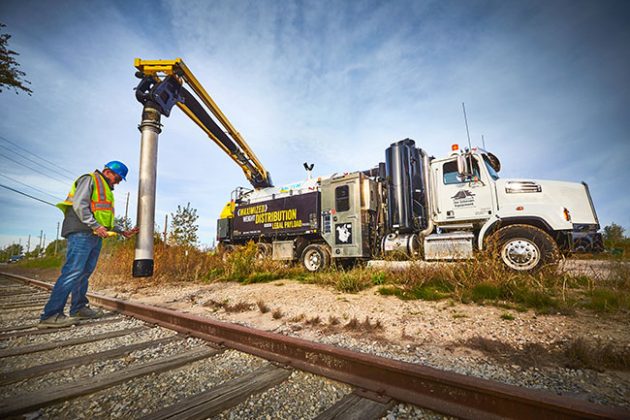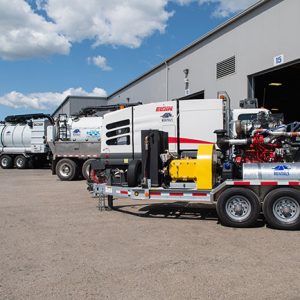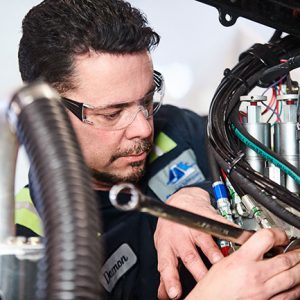
Cleaning up
By Andrew Snook
Features ProfilesJoe Johnson Equipment has made a clean sweep in the rental market with its unique offering.
 Joe Johnson Equipment founders worked in the heavy equipment manufacturing segment for a few years until they realized that they were equipped to enter the rental market on their own.
Joe Johnson Equipment founders worked in the heavy equipment manufacturing segment for a few years until they realized that they were equipped to enter the rental market on their own. Being the leader in a market in the rental industry is no small feat. So, for Joe Johnson Equipment to start up in 1988 and grow to become Canada’s leading infrastructure-maintenance equipment supplier – and one of the largest in North America – is an impressive accomplishment.
JJE founders Joe Johnson Sr. and his son, Jeff Johnson, were able to identify a niche demand in the rental space for serving municipalities, contractors, haulers and industrial companies.
“I started with my father in 1988. I had worked for my father previously for three years at a heavy equipment manufacturing company,” Jeff recalls. “During those three years working with him I learned a fair bit and we came to the conclusion there was a great opportunity to do this on our own.”
The company specializes in the rental of vacuum excavation and hydrovac equipment, as well as street sweepers, sewer equipment, industrial equipment, water blasters, refuse equipment, snow removal equipment, trailers, mowing equipment, leaf, litter and parks equipment, and more.
Headquartered in Innisfil, Ont., JJE has 11 locations across Canada and 13 locations across the U.S. employing approximately 300 people.
The company originally operated like a distributor similar to a truck dealership, but opted to add the rental side of the business as the company grew.
“We never want to have to say ‘No’ to a customer, and that’s how we added on rentals in our business. For the first 15 years, we didn’t have rentals. But there was a customer need and that was one of the opening reasons for getting into rentals,” Jeff says.
JJE’s current rental fleet consists of about 450 units. Of those, 250 would be in Canada and the remainder in the U.S. The fleet value is approximately $150 million.
“Our utilization goal is 70 percent,” Jeff says.
Unlike many traditional equipment rental houses, the biggest component in JJE’s fleet are vacuum trucks. It is this niche that made JJE attractive in 2016 to its largest supplier, Federal Signal Corporation, a global designer, manufacturer and supplier of products and solutions for municipal, governmental, industrial, and commercial customers headquartered in Oak Brook, Ill.
“One of the main reasons we sold Joe Johnson Equipment was because of the rentals,” Jeff explains. “That industry was growing so quickly, and each asset is north of $500,000. We were falling on challenging times to add units to our fleet. We had reached out to Federal Signal, which manufactures those vacuum trucks, and we were looking at bringing on more debt and possibly a business partner. They liked our approach so much that within 90 days they decided they wanted in and they ended up buying 100 percent of JJE. That gave us another $60 million to put towards the rental fleet to get where we are today. And there’s still growth opportunity out there.”
In addition to the rentals JJE offers its clients, the company sells new and used equipment. The rent-to-own equipment side of the business works well with its fleet management philosophy.
“We typically don’t keep anything in the fleet that’s more than two years old,” Jeff says, adding that the COVID-19 pandemic had created an exception to that rule due to lower-than-average utilization rates. “We like to replace units within 18 to 24 months.”
With the cost of brand-new equipment unattainable for some smaller companies, rental and rental purchase options make the most sense. Jeff says his favourite part of the rental side of the business is helping those smaller companies meet their equipment needs.
“Our rental business was spawned because of a lot of smaller companies had needs but couldn’t afford to go to the bank and get $300,000,” he says. “My favourite part of rentals is offering a solution to our customers to be able to grow their business. They can pay the monthly rental rate versus going out and committing to a five- or seven-year lease of hundreds of thousands of dollars. They can finance and run their business smarter knowing we have their back. We helped a lot of small fleets of one or two units turn into 10- and 20-vehicle fleet companies.”
JJE’s fleet turnover strategy also works well for servicing its larger contractors. Jeff says some larger companies prefer to rent a new unit for a specific number of months for a more accurate line-item estimate when bidding jobs.
“We see a lot of the bigger companies using it as a job-costing advantage. It’s been a unique trend we’ve seen in the last 10 years,” Jeff says. “In between all that is a good blend of customer base. It creates a good used unit for somebody else. PCL, for example, takes it for six months then gives the unit back. Now you’ve got a group of companies, smaller guys, looking for a deal that would love to buy something and save $50,000 or $60,000. Of our 450 units, our turnover is 25 to 30 units per year we try and sell. We focus on 100 to 150 units we’ll want to replace every year.”
One challenging aspect of operating the rental side of the business across two countries is making sure clients have the right equipment they need to pass through the scales.
“Almost all our trucks are going up and down roads that have scales on them, so they’re very weight sensitive. That has created a real challenge for us throughout North America because each province and state have different weight laws,” Jeff explains. “We need to buy different axle configurations to get through different states and provinces. You can’t use the same truck in Ontario as in Alberta, or in Quebec or Atlantic Canada.”
Customers also have different needs for their vacuum trucks, depending on the jobs they’re tackling.
“Depending on how they’re going to work, they’ll need a different size.
Vacuum trucks, small and big ones, are based on what that next job is. They may need a different style or capacity, or a different configuration of wheels, depending on the province. Having that additional flexibility is very appetizing to the customers,” Jeff says.

With its unique rental offering, especially vaccuum excavation and hydrovac equipment, JJE has been sweeping up success in every area it expands to.
Aftersales support
A big part of how the company has grown its business in recent years is in aftersales support.
“We’ve grown our business on aftersales service, always being there from a mechanical and technical perspective. We resolve our customers’ pains as efficiently as possible,” Jeff says. “Each facility has standalone buildings with full service with technicians in each location.”
While every rental unit at JJE is equipped with GPS technologies that are used to run reports based on hours and mileage, some clients are asking for more.
“Some customers are asking for more data in real time from a service and operator perspective,” Jeff says.
JJE’s fleet of vacuum trucks are far from the cheapest products available, but the company makes up for the additional cost with strong service and reliable equipment.
“Customers have come to the realization that we have their back. We can juggle and fulfill their immediate needs,” Jeff says. “We’re not the cheapest but our products are the Cadillacs of the vacuum truck industry. We spend more money on the units than others would, especially from a safety perspective. It makes the customer feel that much more secure.”
COVID-19 impact
Like most equipment rental houses, JJE quickly felt the impact of COVID-19 when the pandemic was officially declared in March 2020.
“Everything came to a halt,” Jeff says. “We were exceeding all of our utilization targets until March of last year. One of the unfortunate things is that as soon as infrastructure or roadbuilding stops, the easiest thing to get rid of is the rental unit. So, we had an influx of vehicles come back all at the same time.”
To keep operations running, JJE was forced send many of its employees home and run locations with skeleton staffs.
“It even got to a stage within the office that employees had to have their own office or work station to keep some extra distance, and get used to using Zoom and Teams for meetings,” Jeff says.
JJE shifted much of its equipment rental training and employee training to online platforms.
“Our deliveries increased as well, instead of customers picking the units up to keep that distance. Made it easier for both sides,” Jeff adds.
The company also created a rental parts package for its customers.
“It used to be customary they would come into a showroom and handpick all the tools. The rental tool packs are designed to fit their needs, and you only pay as you use them,” Jeff says. “This eliminated people from the showroom. It was a good learning experience. The customers liked it and it helped increase our parts business and simplified things.”
Bright future ahead
Jeff is happy to announce that JJE’s rental equipment business has recently been returning to its pre-pandemic utilization time targets.
“In Canada, we’re optimistic. It’s definitely picking up. The first six months of 2021 we’re back to our Canadian 2019 numbers,” Jeff says.
The company is currently reviewing opportunities for further expansion.
“We are planning on growing and adding additional locations in southwestern Ontario. We’re continuously looking at growing the fleet but it’s all utilization based. We’ll continue to grow the fleet in a smart, timely manner,” Jeff says.
Print this page

